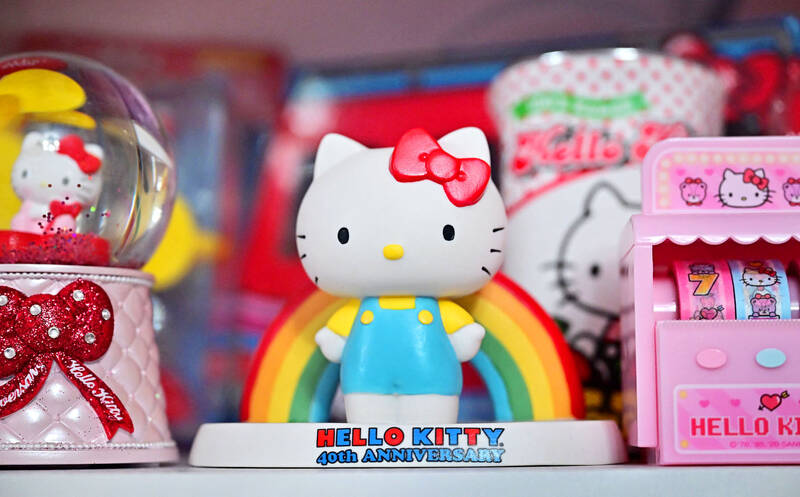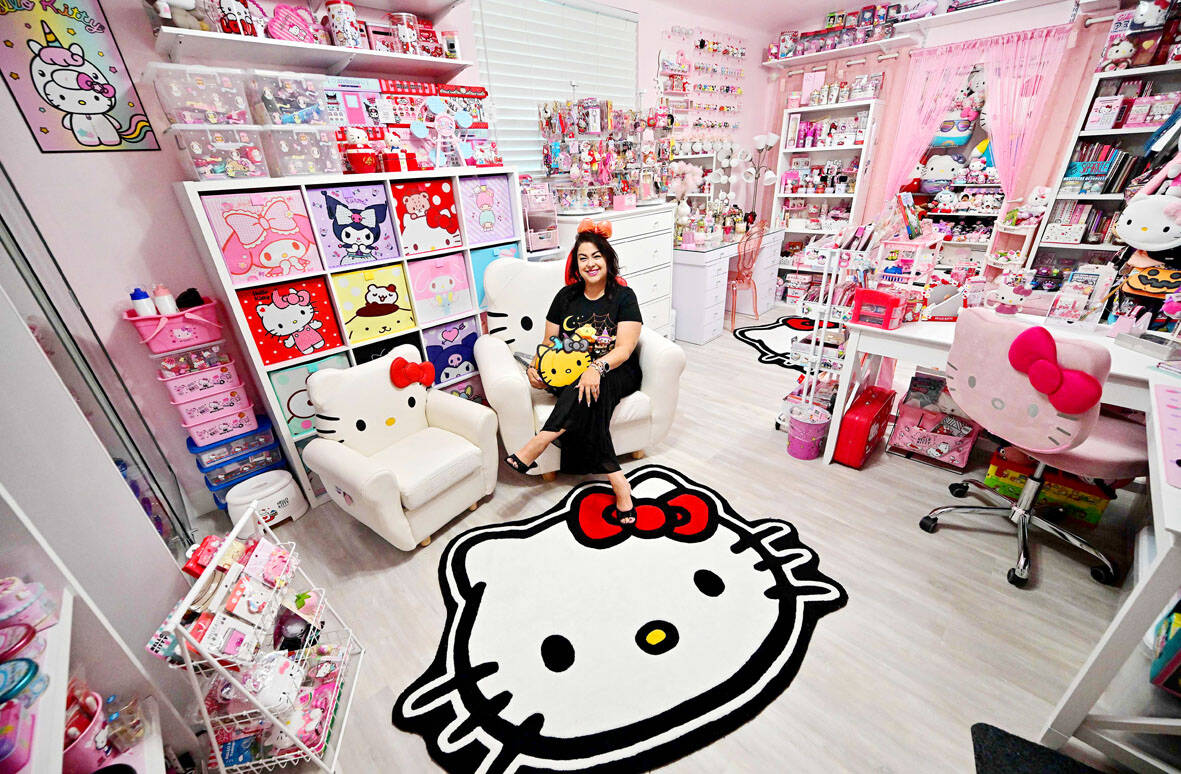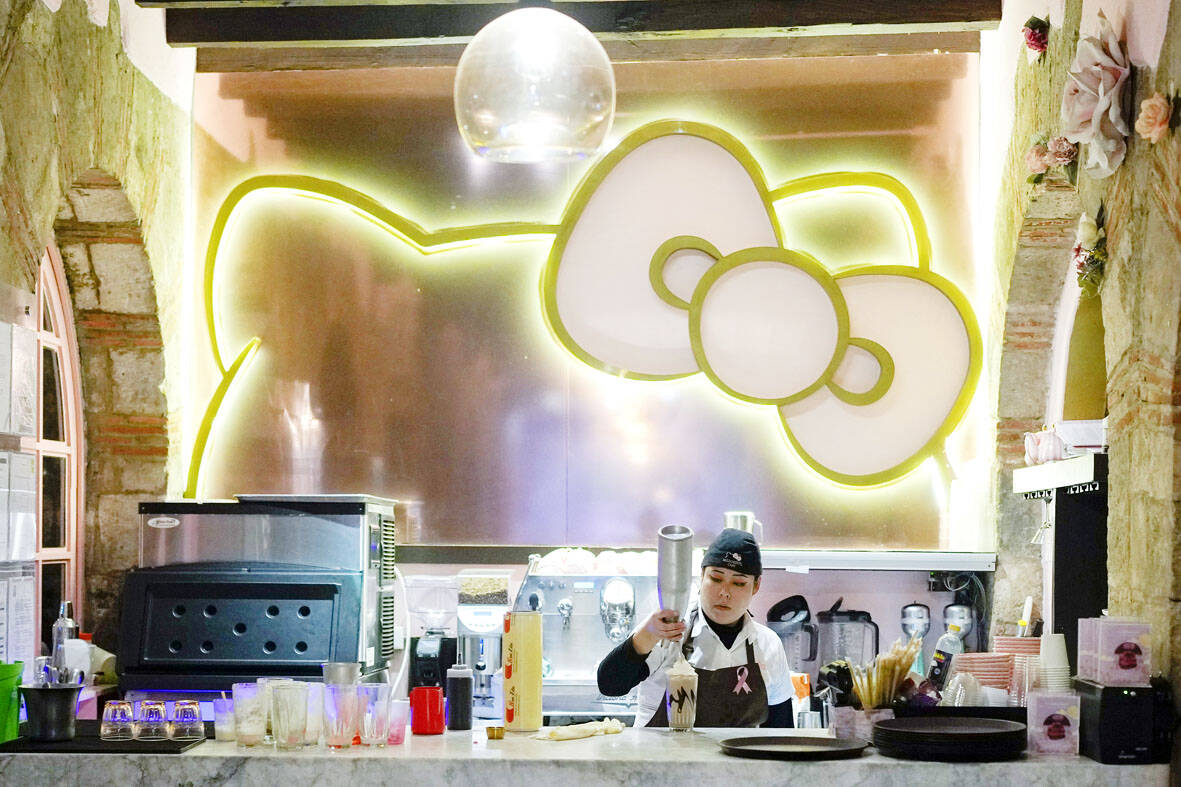Hello Kitty, the cute, enigmatic character that adorns everything from handbags to rice cookers, turns 50 tomorrow — still making millions for her Japanese creators.
The simple design of the character — who is not a cat, but a little girl from London according to Sanrio, the company behind Kitty — has mileage as a money-spinner for years to come, experts say.
One woman in the US state of California has amassed so much Hello Kitty merchandise that her husband built her a pink so-called “she-shed” to keep it in.

Photo: AFP
Stuffed inside are thousands of toys and other items featuring Kitty and her eye-catching red bow, including rows of sunglasses, a swivel chair and novelty gumball dispensers.
“People my age, you know, we are told many times, ‘Hello Kitty is for little kids,’ and I laugh at that,” said Helen from Riverside County, conceding she is “50 plus.”
Helen, who drives a Hello Kitty-decorated SUV and runs the local fan club “Hello Kitty SoCal Babes,” has been “obsessed” with the character since its 1970s US debut.

Photo: AFP
Her vast collection of Hello Kitty plushies “make me feel warm,” she said, describing spending hours among the soft toys, many of them rare, on a regular basis.
“Something in my inner child gets healed,” she said.
Hello Kitty started life as an illustration on a vinyl coin purse.

Photo: AFP
It has since appeared on tens of thousands of products — official and unofficial — including tie-ups with Adidas, Balenciaga and other top brands.
The phenomenon shows no sign of slowing, with a Warner Bros movie in the pipeline and a new Hello Kitty theme park due to open next year on China’s tropical Hainan island.
Sanrio’s share price has soared more than seven-fold, pushing its market cap over one trillion yen (US$6.8 billion), since young CEO Tomokuni Tsuji took over from his grandfather in 2020.
‘PURE PRODUCT’
“We’d be foolishly cynical to say that we don’t need these soft, fluffy, pink things,” said Christine R. Yano of the University of Hawaii.
In fact, “given the fraught nature of our contemporary lives, perhaps we need it now more than ever,” said Yano, author of the book Pink Globalization about Hello Kitty.
“This is not a phenomenon that has died or is going to die, at least soon.”
Unlike other Japanese cultural exports such as Pokemon or Dragon Ball, there is minimal narrative around the character, whose full name is Kitty White.
She has a twin sister Mimmy, a boyfriend called Dear Daniel and a pet cat of her own, Sanrio says. She loves her mother’s apple pie and dreams of becoming a pianist or poet.
The rest is left to fans’ imaginations — just like her “abstract, bare design that can speak with a kind of simplicity and elegance to more people,” Yano said.
“I call her a ‘pure product,’” the researcher added.
Some feminists say Hello Kitty’s lack of mouth is a symbol of disempowerment, but Yano counters that by not depicting it, “she has a greater range of expression.”
Famous Hello Kitty fans include Lady Gaga, Nicki Minaj and Katy Perry, and her appeal extends to royalty: Britain’s King Charles wished her a happy birthday this year.
And on Hello Kitty’s TikTok account — whose bio is “CEO of supercute” — sardonic memes and footage from “Hello Kitty Day” at US baseball games delight 3.5 million followers.
‘KAWAII’
Hello Kitty is the epitome of Japan’s kawaii — cute — soft power, and she is the mascot of a campaign promoting good tourist etiquette in Tokyo.
Posters celebrating the 50th anniversary are on display at Sanrio Puroland theme park, where businesswoman Kim Lu from Manila had brought her four-year-old niece on their holiday.
“This really is our priority here in Tokyo,” she said.
“To be honest, we really don’t know” the reason for Hello Kitty’s ineffable popularity, said Lu, 36.
“I think it’s the kawaii charm.”
Sanrio owns the copyright to hundreds of other popular characters, and Hello Kitty now accounts for 30 percent of profits, down from 75 percent a decade ago.
But Kitty is still a favorite of 23-year-old Rio Ueno, who took an overnight bus from Japan’s northern Niigata region to visit the park with a friend.
“I’ve had Kitty goods around me since I was a small child,” said Ueno, dressed in a fluffy Hello Kitty sweater, sporting a Kitty bag and clutching a Kitty doll.
“She is someone who is always close to me, and I want it to stay that way.”

The Democratic Progressive Party (DPP), Chinese Nationalist Party (KMT), and the country’s other political groups dare not offend religious groups, says Chen Lih-ming (陳立民), founder of the Taiwan Anti-Religion Alliance (台灣反宗教者聯盟). “It’s the same in other democracies, of course, but because political struggles in Taiwan are extraordinarily fierce, you’ll see candidates visiting several temples each day ahead of elections. That adds impetus to religion here,” says the retired college lecturer. In Japan’s most recent election, the Liberal Democratic Party lost many votes because of its ties to the Unification Church (“the Moonies”). Chen contrasts the progress made by anti-religion movements in

Taiwan doesn’t have a lot of railways, but its network has plenty of history. The government-owned entity that last year became the Taiwan Railway Corp (TRC) has been operating trains since 1891. During the 1895-1945 period of Japanese rule, the colonial government made huge investments in rail infrastructure. The northern port city of Keelung was connected to Kaohsiung in the south. New lines appeared in Pingtung, Yilan and the Hualien-Taitung region. Railway enthusiasts exploring Taiwan will find plenty to amuse themselves. Taipei will soon gain its second rail-themed museum. Elsewhere there’s a number of endearing branch lines and rolling-stock collections, some

This was not supposed to be an election year. The local media is billing it as the “2025 great recall era” (2025大罷免時代) or the “2025 great recall wave” (2025大罷免潮), with many now just shortening it to “great recall.” As of this writing the number of campaigns that have submitted the requisite one percent of eligible voters signatures in legislative districts is 51 — 35 targeting Chinese Nationalist Party (KMT) caucus lawmakers and 16 targeting Democratic Progressive Party (DPP) lawmakers. The pan-green side has more as they started earlier. Many recall campaigns are billing themselves as “Winter Bluebirds” after the “Bluebird Action”

Feb 24 to March 2 It’s said that the entire nation came to a standstill every time The Scholar Swordsman (雲州大儒俠) appeared on television. Children skipped school, farmers left the fields and workers went home to watch their hero Shih Yen-wen (史艷文) rid the world of evil in the 30-minute daily glove puppetry show. Even those who didn’t speak Hoklo (commonly known as Taiwanese) were hooked. Running from March 2, 1970 until the government banned it in 1974, the show made Shih a household name and breathed new life into the faltering traditional puppetry industry. It wasn’t the first